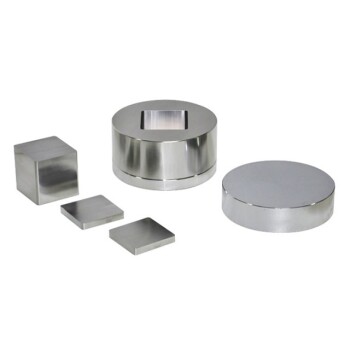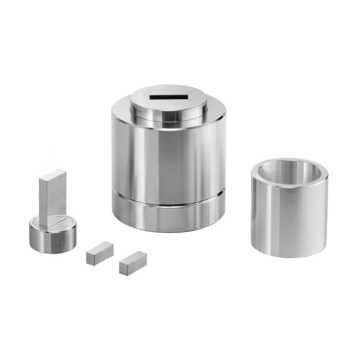At their core, laboratory presses are versatile tools for applying precise and controlled force to a material. Their common applications span three primary domains: preparing samples for scientific analysis, testing the physical properties of materials, and conducting small-scale molding or production runs for research and development.
A laboratory press is not a single-purpose tool but a foundational platform for material transformation. Its true value lies in its ability to apply repeatable pressure—and often heat—to compress, mold, test, or extract, making it indispensable in modern research, quality control, and development environments.

The Primary Functions of a Laboratory Press
A lab press solves the fundamental problem of needing to apply a known amount of force to a small amount of material in a controlled, repeatable way. This core capability branches into several distinct applications.
Sample Preparation for Analysis
This is one of the most common uses. Raw materials, especially powders, are often unsuitable for direct analysis with sophisticated instruments. The press creates a uniform, solid sample required for accurate measurement.
- Spectroscopy Pellets: Presses are used to create small, dense pellets from powdered material. This is critical for techniques like FTIR spectroscopy, where a sample is mixed with potassium bromide (KBr) powder and pressed into a transparent disc.
- XRF Pellets: For X-ray Fluorescence (XRF) analysis, powdered samples are compressed into solid, flat pellets to ensure a consistent surface and density, which is crucial for obtaining reliable elemental composition data.
- Bomb Calorimetry: Samples are pressed into compact forms to ensure complete and uniform combustion when measuring their energy content.
Material Properties Testing
Understanding how a material behaves under stress is a cornerstone of materials science and engineering. A laboratory press is the ideal tool for applying that stress in a controlled environment.
- Compressive Strength: The press is used to crush a material and measure the maximum force it can withstand before failing. This is vital for ceramics, composites, and concrete formulations.
- Flexural Strength: With specific fixtures, a press can perform a "three-point bend test" to determine how much a material can bend before it breaks, a key metric for both rigid and flexible materials.
- Flow and Extrusion Tests: The press forces a material through a die to measure its flow characteristics under pressure, which is essential for developing polymers, pastes, and foods.
Small-Scale Production and Prototyping
Beyond analysis, presses are used to create actual objects, making them valuable tools for research, development, and lean manufacturing.
- Molding and Forming: Heated presses (hot presses) are used to mold polymers, composites, and rubber into specific shapes for prototypes or short production runs. They allow researchers to test new material formulations quickly.
- Laminating: By pressing multiple layers of material together, often with heat, a press can create laminated composites for testing or specialized applications.
- Briquette and Ceramic Forming: Powdered materials, from metal dust to ceramic clays, can be pressed into dense bricks or shapes for further processing, such as sintering.
Understanding the Trade-offs
While incredibly versatile, a laboratory press is not a universal solution. Understanding its limitations is key to using it effectively.
Scale: Designed for the Lab, Not the Factory
Laboratory presses are optimized for precision and versatility, not volume. They are perfect for R&D, quality control testing, and limited production runs. They are not designed for the high-speed, high-volume demands of full-scale manufacturing.
Function is Dictated by Tooling
The press itself only provides force. Its true application is defined by the dies, molds, and platens used with it. A press for making KBr pellets is useless for molding a polymer part without the correct heated mold. The tooling is as important as the press itself.
Manual vs. Automated Control
Simpler, manual hydraulic presses are cost-effective and robust for basic pellet-making. However, R&D applications involving polymers or composites often require automated presses with programmable cycles for precise control over pressure, temperature, and time. This added control comes at a higher cost and complexity.
Making the Right Choice for Your Goal
To select the right tool, you must first define its primary job.
- If your primary focus is routine sample preparation for spectroscopy (FTIR, XRF): A basic, manual benchtop hydraulic press with a standard pellet die set is your workhorse.
- If your primary focus is materials research with polymers or composites: A heated press (hot press) with programmable temperature and pressure controls is essential for repeatable results.
- If your primary focus is quality control or small-batch production: A robust, automated press with options for custom dies is necessary to ensure consistency and reliability.
By understanding these core functions and trade-offs, you can effectively leverage a laboratory press to transform your materials and advance your work.
Summary Table:
| Application Area | Key Functions | Common Uses |
|---|---|---|
| Sample Preparation | Create uniform solid samples | FTIR/XRF pellets, bomb calorimetry |
| Material Testing | Measure stress and properties | Compressive/flexural strength, flow tests |
| Small-Scale Production | Mold and form materials | Prototyping, laminating, briquette forming |
Ready to elevate your laboratory's capabilities? KINTEK specializes in high-performance lab press machines, including automatic lab presses, isostatic presses, and heated lab presses, designed to meet the precise needs of R&D, quality control, and small-scale production. Our solutions deliver reliable force application, enhanced repeatability, and superior material transformation to accelerate your research and development. Don't let equipment limitations hold you back—contact us today to discuss how our lab presses can bring value to your projects and drive innovation in your work!
Visual Guide

Related Products
- Automatic Laboratory Hydraulic Press Lab Pellet Press Machine
- Laboratory Hydraulic Press 2T Lab Pellet Press for KBR FTIR
- Manual Laboratory Hydraulic Press Lab Pellet Press
- Automatic Laboratory Hydraulic Press for XRF and KBR Pellet Pressing
- Manual Heated Hydraulic Lab Press with Integrated Hot Plates Hydraulic Press Machine
People Also Ask
- What are the limitations of hand-operated presses? Avoid Sample Compromise in Your Lab
- How do hydraulic pellet presses contribute to material testing and research? Unlock Precision in Sample Prep and Simulation
- What is the purpose of creating pellets for XRF spectroscopy using a hydraulic press? Ensure Accurate and Repeatable Elemental Analysis
- What are the advantages of using a hydraulic press for pellet production? Achieve Consistent, High-Quality Samples
- What are the key steps for making good KBr pellets? Master Precision for Flawless FTIR Analysis



















